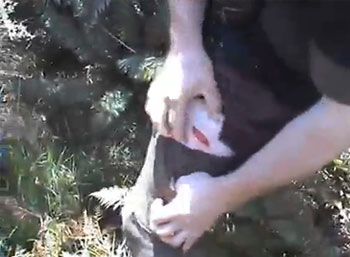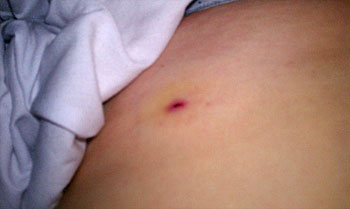
Just as we train our bodies and minds to fire weapons while hunting or in self-defense, so should we train and prepare them for injury. When we learn the basic drawstroke of our pistol, it’s done over and over again until we are proficient and muscle memory can take over. After thousands of repetitions, no matter what the circumstance, you will be prepared to pull your pistol from your holster, bring it through the retention and extension positions, and be ready to fire. This should become second nature.
Under stress, our body and mind does many things. Our vision narrows, time seems to slow down, and we lose fine motor skills. When we are injured, the same concepts apply. We need to rehearse over and over again what would happen if we suffered a serious wound to our body, whether it be to the chest, abdomen, or an extremity. It’s just a fact: Injuries happen. I’ve included a picture that’s gone around the web of where a hog bested a hunter.
Just as we learn to draw our pistols and fire without hesitation, we should learn to draw on our necessary equipment when we are injured. Pull out your IFAK, open it, expose your injured area, place proper bandage, and place tourniquet properly. If it’s a chest injury, proper chest seal placement is crucial. The products in modern IFAKs are complex and require more training than just a first aid class to correctly use these items. Remember, this is your life we are talking about.
Preparing your mind for injury is not a pessimistic outlook. If you go into danger’s way, you have to be ready for what danger has to offer. Taking a Superman approach will get you nowhere quickly. You have to be prepared for whatever happens. If and when you are injured, knowing that you are hurt is already a good sign, and you will most likely survive.
You have to have a trained mind so your hands can move freely and perform the tasks necessary. You need to immediately diagnose the problem and start moving quickly to solve it. Sometimes seconds can mean life or death.
I have seen a highly trained professional receive a grazing bullet wound to his abdomen. This veteran officer in full SWAT kit fell to the ground and was in tears, screaming he had been hit and was going to die. He calmed down, and upon further examination of his wound, he stood up, walked to the ambulance and was discharged from the ER an hour later with only a tetanus shot.
I also know an officer who had been hit several times by direct and indirect fire, and he stayed in the fight until it was over. Afterwards, he went to the hospital by ambulance and had surgery. Does this mean that one person is weaker or stronger than the other? Not at all. One was more prepared than the other.
 One day on the range, we were conducting extreme close quarters battle training with the targets about one foot in front of us. The officer next to me was shooting his target like the rest of us. One of his rounds hit a piece of steel rebar, bounced back, and hit me. What was left of the bullet went through my plate carrier, under the plate, right into my “steel” love handle.
One day on the range, we were conducting extreme close quarters battle training with the targets about one foot in front of us. The officer next to me was shooting his target like the rest of us. One of his rounds hit a piece of steel rebar, bounced back, and hit me. What was left of the bullet went through my plate carrier, under the plate, right into my “steel” love handle.
It felt like I had been cracked with a bullwhip, followed by an intense burning sensation. I knew immediately that I had been hit but not seriously. I secured my weapon and left the firing line with the instructor.
At the time, I was not prepared to be injured. We were on a safe range, a safe firing line, and with professional instructors — most of whom were seasoned medics or physicians! What’s the worst that could happen, right? I stayed calm and collected and went to the rear for further exam by the doctors on scene.
My gear was removed and my wound examined, which led to the discovery of a four to five-millimeter hole that was bleeding. We drove to the local ER where CT scans were done. They gave me a mental prep in case I needed surgery. It turned out I did not need surgery and was sent home with some antibiotics and a band aid! I am glad I was not the one on the ground, flopping about, thinking I was going to die.
Being trained and prepared for injury is a very necessary skill to have. The better trained you are, the better chance you have of surviving an injury. I would highly, highly recommend taking a class given by Lt. Steve Harris of the Richmond Police Department in California. He is by far the best lecturer on this topic in my opinion.
Prepared or unprepared? Trained or untrained? Which one are you?
The advice given is from a trained professional. It is intended as general information only and should not be considered as medical advice. Proper training by a certified professional is highly recommend before using any of this information. Anyone that uses the information contained in these articles is solely responsible for the resulting consequences good or bad. SHWAT™ and it’s writers are not responsible for your actions. To make it simple, we believe this information to be helpful. We hope you never need this information but if you do and If you use it and screw someone or something up, we at SHWAT™ cannot be blamed for what you did or didn’t do. Happy hunting!

